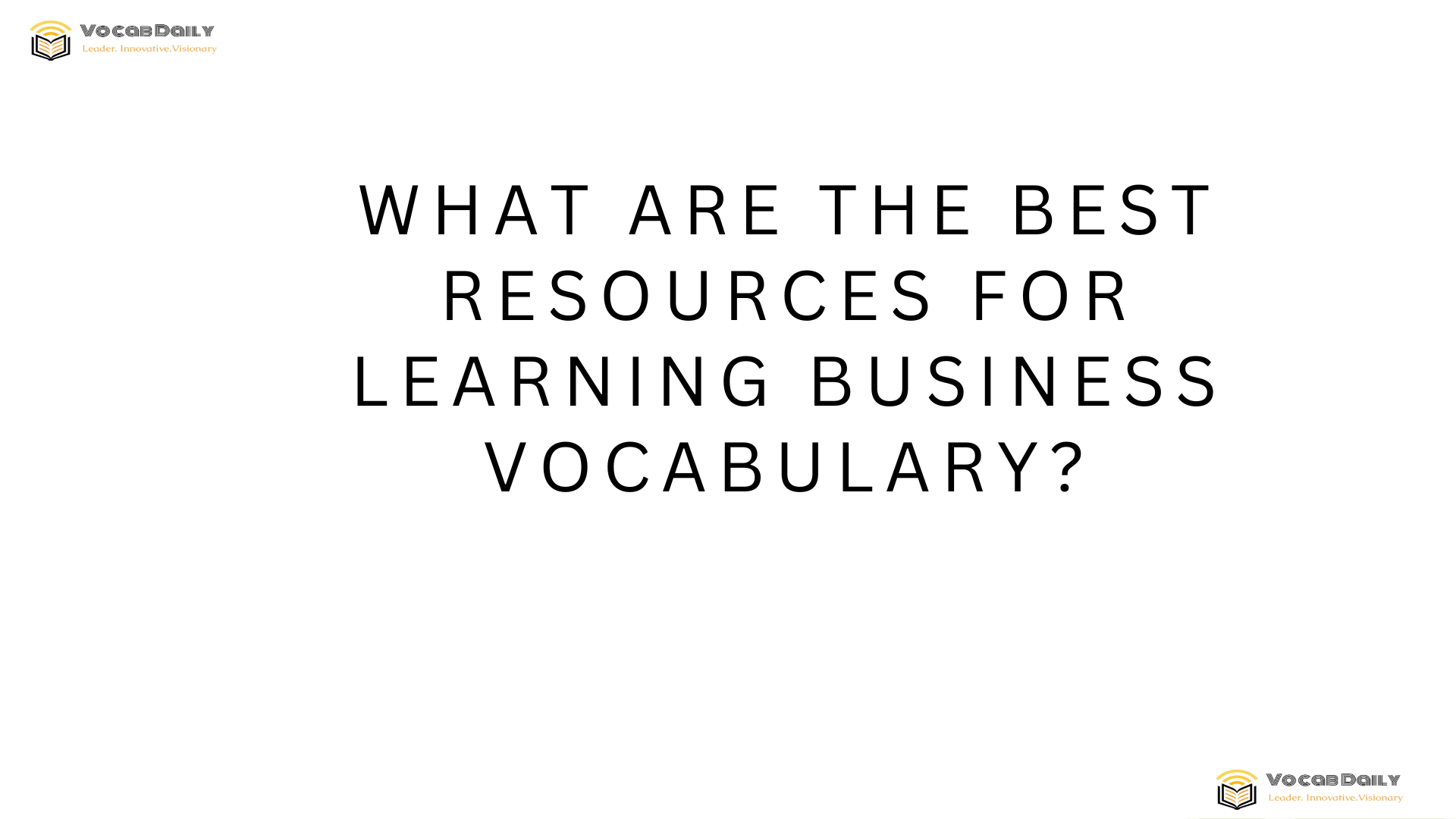What are the best resources for learning business vocabulary
Online Business Vocabulary Courses
One of the most effective ways to improve your business vocabulary is through online courses specially designed for professionals. Platforms like Coursera, Udemy, and LinkedIn Learning offer comprehensive courses that focus on business English and vocabulary used in corporate settings. These courses often include real-world scenarios, interactive exercises, and quizzes that make learning engaging and practical. By enrolling in these courses, learners can build confidence in using industry-specific terms that are relevant to meetings, negotiations, presentations, and writing emails or reports.
Business Vocabulary Apps
Mobile apps provide a convenient method to enhance your business vocabulary on the go. Apps such as Quizlet, Memrise, and the VocabDaily app create personalized learning experiences through flashcards, word games, and spaced repetition techniques. These apps allow learners to focus on terminology related to finance, marketing, management, and other business areas. Regular practice with vocabulary apps helps reinforce memory and allows users to study anytime, whether commuting, during breaks, or between meetings.
Business Dictionaries and Glossaries
Traditional resources such as business dictionaries and glossaries remain indispensable for learning precise definitions and usage of business terms. Websites like Investopedia and The Financial Times Glossary provide detailed explanations of financial, managerial, and economic vocabulary. Additionally, printed business dictionaries like the “Oxford Dictionary of Business Terms” offer a comprehensive resource for users who prefer a reference tool. These materials help learners understand complex terms, acronyms, and jargon found in reports, contracts, and business literature.
Business News Outlets
Reading business news regularly is a practical way to immerse yourself in the language used by professionals worldwide. Websites and publications such as Bloomberg, The Wall Street Journal, and Forbes feature articles filled with current business terminology. Observing how words are used in context helps learners grasp nuances and improve comprehension. Subscribing to newsletters or listening to podcasts produced by these outlets can also boost vocabulary acquisition while keeping you updated on the latest market trends.
Professional Networking Platforms
Platforms like LinkedIn offer dynamic environments where you can engage with business professionals and industry experts. Reading posts, articles, and comments on LinkedIn exposes you to practical business language used in day-to-day communication. Joining groups and participating in discussions helps learners practice newly learned vocabulary in authentic contexts. Furthermore, LinkedIn Learning courses specifically curated for business communication provide structured vocabulary lessons complemented by real-life applications.
Business English Textbooks and Workbooks
For learners preferring structured study, business English textbooks and workbooks provide organized lessons with clear objectives. Books like “Market Leader” by Pearson or “English for Business Studies” by Cambridge University Press include chapters that address key topics such as negotiations, presentations, and email writing with vocabulary lists and exercises. These books are particularly useful for ESL learners or those preparing for exams such as the TOEIC or BEC, offering controlled learning environments to develop confidence and competence.
YouTube Channels and Video Series
Visual and auditory learners benefit greatly from YouTube channels focusing on business English and vocabulary. Channels like BBC Learning English and Business English Pod provide free content that defines and explains business terms, often using real-life examples or role plays. Videos are excellent for understanding pronunciation, idiomatic expressions, and professional tone. Many channels also offer downloadable subtitles and supplementary materials, enhancing retention and encouraging active learning.
Podcasts on Business and Economics
Listening to podcasts dedicated to business, finance, and economics is a powerful way to hear vocabulary used naturally by experts. Popular podcasts such as “The Indicator from Planet Money” and “HBR IdeaCast” discuss current business topics while introducing specialized vocabulary in a conversational manner. This method improves active listening skills and builds vocabulary connected to real-world contexts. Podcasts are flexible resources for learning during travel, workouts, or while multitasking.
Interactive Business Vocabulary Quizzes
Engaging with online quizzes specifically targeted at business vocabulary accelerates both recognition and recall of terms. Websites like VocabDaily and Quizlet feature quizzes tailored to different business domains, allowing learners to test their knowledge and track progress. These interactive activities reinforce memory through repetition and offer immediate feedback, a feature highly beneficial for learners eager to improve accuracy and usage of business expressions.
Corporate Training Programs and Workshops
Many companies invest in corporate training programs that include business vocabulary enhancement as part of professional development. Workshops focusing on communication skills often introduce key terminology relevant to leadership, sales, customer service, and other functions. Participating in these sessions gives learners practical experience in using business terms correctly in workplace scenarios. Additionally, such programs often provide post-training materials and resources that support ongoing vocabulary growth.
Reading Business Books and Case Studies
Diving into business books or case studies is a valuable method for gaining both industry knowledge and specialized vocabulary. Books authored by business leaders and experts introduce terms within meaningful narratives about strategy, innovation, and management. Case studies particularly highlight problem-solving vocabulary and analytical expressions frequently used in corporate decision-making. This immersive approach helps learners understand the practical application of complex vocabulary in high-level business discussions.
Online Forums and Discussion Boards
Participating in online forums such as Reddit’s r/business or specialized LinkedIn groups grants access to diverse business language in an informal setting. Users share insights, ask questions, and engage in debates using everyday business terminology. This type of interaction provides exposure to idiomatic expressions, contemporary slang, and professional jargon. Moreover, learners can ask for explanations and receive peer feedback, fostering a collaborative learning environment that encourages constant vocabulary practice.
Business Vocabulary Newsletters
Subscribing to newsletters focused on business vocabulary offers curated weekly or monthly updates of new words, phrases, and idioms. Newsletters like those from VocabDaily provide practical tips, example sentences, and quizzes that are easy to incorporate into daily study routines. With the convenience of email delivery, learners receive regular motivation and can gradually build their professional lexicons without overwhelming themselves.
Also check out VocabDaily workbook collections.

Leave a Reply